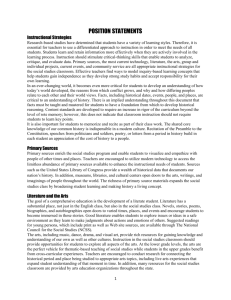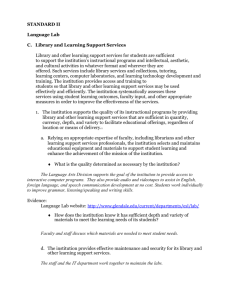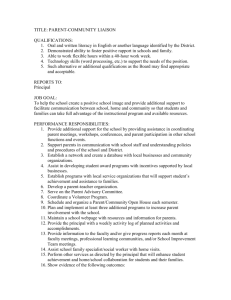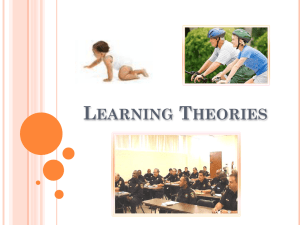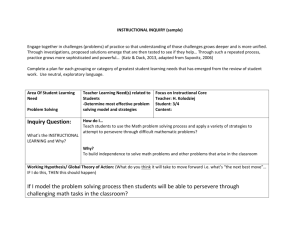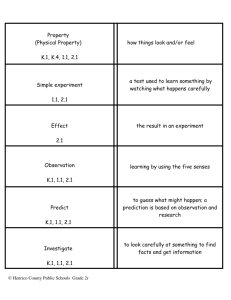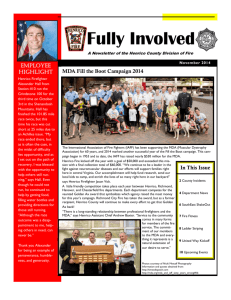Elementary Art Example- Instructional Planner Word Format R2
advertisement
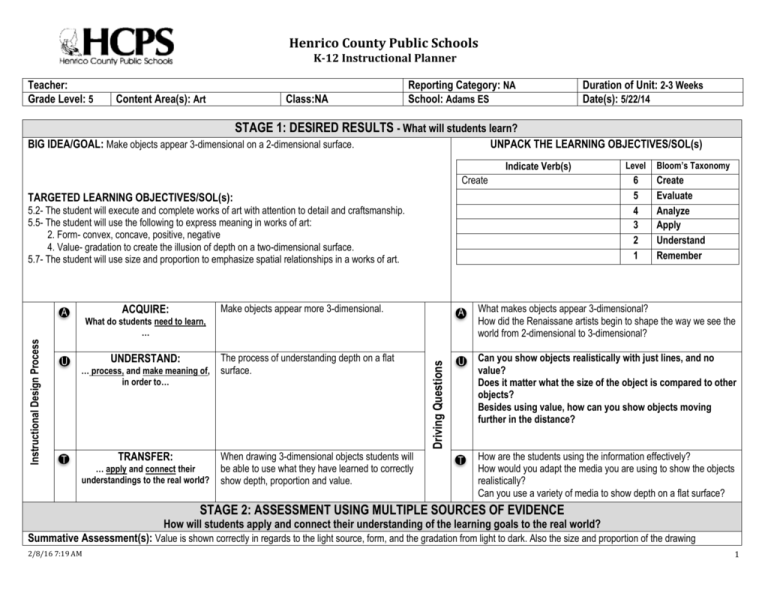
Henrico County Public Schools K-12 Instructional Planner Teacher: Grade Level: 5 Content Area(s): Art Class:NA Reporting Category: NA School: Adams ES Duration of Unit: 2-3 Weeks Date(s): 5/22/14 STAGE 1: DESIRED RESULTS - What will students learn? BIG IDEA/GOAL: Make objects appear 3-dimensional on a 2-dimensional surface. UNPACK THE LEARNING OBJECTIVES/SOL(s) Indicate Verb(s) Create TARGETED LEARNING OBJECTIVES/SOL(s): 5.2- The student will execute and complete works of art with attention to detail and craftsmanship. 5.5- The student will use the following to express meaning in works of art: 2. Form- convex, concave, positive, negative 4. Value- gradation to create the illusion of depth on a two-dimensional surface. 5.7- The student will use size and proportion to emphasize spatial relationships in a works of art. ACQUIRE: U T UNDERSTAND: … process, and make meaning of, in order to… TRANSFER: … apply and connect their understandings to the real world? 6 5 4 3 2 1 Bloom’s Taxonomy Create Evaluate Analyze Apply Understand Remember Make objects appear more 3-dimensional. A What makes objects appear 3-dimensional? How did the Renaissane artists begin to shape the way we see the world from 2-dimensional to 3-dimensional? The process of understanding depth on a flat surface. U Can you show objects realistically with just lines, and no value? Does it matter what the size of the object is compared to other objects? Besides using value, how can you show objects moving further in the distance? T How are the students using the information effectively? How would you adapt the media you are using to show the objects realistically? Can you use a variety of media to show depth on a flat surface? What do students need to learn, … When drawing 3-dimensional objects students will be able to use what they have learned to correctly show depth, proportion and value. Driving Questions Instructional Design Process A Level STAGE 2: ASSESSMENT USING MULTIPLE SOURCES OF EVIDENCE How will students apply and connect their understanding of the learning goals to the real world? Summative Assessment(s): Value is shown correctly in regards to the light source, form, and the gradation from light to dark. Also the size and proportion of the drawing 2/8/16 7:19 AM 1 Henrico County Public Schools K-12 Instructional Planner emphasizing spatial relationships is accurate. Evidence of Mastery: At least 80 percent of the students were able to show evidence of value on their final project. 2/8/16 7:19 AM 2 Henrico County Public Schools K-12 Instructional Planner STAGE 3: PLANNING INSTRUCTIONAL DELIVERY TO MEET THE NEEDS OF STUDENTS How will students acquire, understand, and transfer new knowledge? How will the delivery of instruction be sequenced and differentiated to optimize achievement for all learners? Indicate Instructional Delivery Date Week 1 Intro/Activate/Engage Direct Instruction Guided Practice Independent Practice Other ____________ Summary/Closure Minutes 5 10 15 30 45 60 90 Cognitive Level(s) 6 Create 5 Evaluate 4 Analyze 3 Apply 2 Understand 1 Remember Description of the Differentiated Instruction, Embedded 21st Century Skills, and Supporting Resources Teacher introduces the artists of the Renaissance and talks about how they began to show depth in their drawings on a flat surface. Examples from history or shown intended to highlight the the change from flat, representational artwork to works that show depth in a more realistic manner. Teacher selects basic objects for a still life arrangement. Choose simple shaped objects that are close to a sphere, cube or pyramid if possible. Set up simple lighting so that objects have shadows. Place in an appropriate spot for all students to be able to see the objects. Student will draw without instruction the still life in their sketchbooks or on practice paper. Once their pre-drawing is complete collect them and put them to the side. Date Week 2 Intro/Activate/Engage Direct Instruction Guided Practice Independent Practice Other ____________ Summary/Closure 2/8/16 7:19 AM 5 10 15 30 45 60 90 6 Create 5 Evaluate 4 Analyze 3 Apply 2 Understand 1 Remember Teacher helps students understand how to draw three-dimensional objects, observing the shadows on objects as well as their size in comparision to other objects in the still life. Students may explore different materials to create the shadows. (watercolor paint pencil, colored pencil) Students create a new still life on 12" x 18" white drawing paper. Formative Assessment(s) The teacher will ask students in the group setting and individually the meaning of vocabulary words. Teacher will collect and analyze the simple forms drawn (sphere, cube, or pyramid) and look through their first still life drawing in their sketchbooks. Teacher will look through the final projects assessing whether students understood proportion, form and value. Evidence of Mastery Students are able to recall and understand the following vocabulary words: value, form and 3dimensional. Students are able to draw simple forms showing shadows, a light source and value going from light to dark. Students are able to understand and explain the vocabulary words without assistance. The works of art they have created show an understanding of values going from light to dark, 3 Henrico County Public Schools K-12 Instructional Planner the proper use of their light source and an understanding of the media they have chosen to work with. Teacher Reflection/Effectiveness of Learning: Teacher would have shown more examples of depth on a flat surface from more modern times helping to make a better connection with students. 2/8/16 7:19 AM 4

